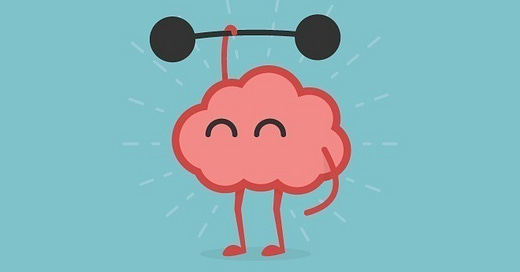We all know the importance of physical fitness for a healthy body, but what about mental fitness?
Just like regular exercise strengthens our muscles and improves our physical resilience, training for mental fitness equips us with the tools to navigate life's challenges and thrive. By actively cultivating our mental well-being, we can build emotional strength, improve our ability to cope with stress, and increase our overall mental health.
Just like building a strong physique requires dedication and a well-rounded workout plan, improving mental health involves a similar approach. Here's how the analogy of physical training translates to improving our mental well-being:
Strength training
Using the analogy of physical fitness, "strength training" for the mind involves rigorously challenging core cognitive skills like memory, reasoning, processing speed, and intense focus through activities that push your cognitive limits.
While no games or apps can single-handedly prevent cognitive decline, incorporating brain training programs proven to target specific cognitive abilities can provide a helpful mental workout. Look for activities designed to systematically exercise working memory, processing speed, reasoning, visual attention, and other skills in progressively challenging ways. Examples include computer-based brain training games, certain types of video games that require divided attention and decision-making under time constraints, and traditional games/puzzles like chess or sudoku. These types of targeted mental exercises can improve performance on specific cognitive tasks.
The brain thrives on novelty. When you learn a new skill, whether it's a language, musical instrument, or complex work/hobby-related skill, it forces your brain to form new neural pathways and connections. This process helps build cognitive reserve and resilience against age-related cognitive decline. Learning keeps the brain active and flexible. Mix it up by periodically taking on a new challenge - the struggle of climbing that learning curve provides an excellent workout for your brain's capacities.
The goal is to build resilience and capacity in key cognitive domains through rigorous and targeted mental workouts, analogous to how strength training builds physical muscle and strength.
Cardio
Reading, especially literary fiction and other thought-provoking material, provides a multidimensional cognitive workout. It engages areas of the brain tied to focus, comprehension, memory, imagination, and analytical thinking. The more you read attentively, the more your brain has to work to construct vivid mental representations and process narratives. Additionally, reading can introduce new ideas, perspectives, and knowledge that stimulate intellectual curiosity and discussion. Both the reading experience and engagement with the content contribute to improved cognitive reserve and vocabulary skills. Make time for reading as part of an overall brain-enriching lifestyle.
Diet
Just as we need to be mindful of the foods we consume for physical health, we must also be conscious of what we "feed" our minds to maintain good mental health and fitness.
What we take in through our senses, thoughts, beliefs, and experiences will either nourish or poison our minds. Just as processed food is toxic to the body, consuming unedifying digital content pollutes the mind and leaves us malnourished emotionally.
On the other hand, feeding our minds with positive, nourishing inputs provides the enrichment needed for mental fitness, just like a nutritious diet energizes the body. Reading uplifting books, listening to educational podcasts, spending time in nature, being around supportive people - these supply the mind with vitamins that boost mood, clarity and resilience.
Limiting our consumption of negativity while purposefully increasing intake of positivity, intellectual stimulation, restful activities and diverse experiences creates a balanced "diet" that exercises and fortifies the mind in a comprehensive way.
Undoubtedly, nutrition plays a big role in brain health, which determines mental health. What you eat has a profound impact on your brain's function and ability to perform at its best. A nutritious diet rich in vegetables, fruits, lean proteins, healthy fats like olive oil and fatty fish, and complex carbohydrates from whole grains provides antioxidants, vitamins, minerals, and other nutrients that nourish the brain and protect against oxidative stress and inflammation. Some top "brain foods" include berries, leafy greens, fatty fish, walnuts, turmeric, dark chocolate, green tea, and foods fortified with omega-3s. Meanwhile, diets high in processed foods, sugars, and unhealthy saturated fats can contribute to cognitive impairment over time.
Rest and Sleep
Resting in between sets of strength training exercises is crucial to an effective and sustainable workout. Likewise, interspersing short breaks during intense brain work will ensure higher productivity and protect against exhaustion and burnout.
Mindfulness meditation can help to focus your attention on the present moment. This practice has been shown to improve working memory, cognitive flexibility, attentional control, and emotional regulation over time. Meditation can make you more aware of distracting thoughts and better able to disengage from them productively. It also relieves stress and anxiety, which can impair cognitive performance. Even brief daily meditation sessions of 10-20 minutes can deliver mental fitness benefits. Additionally, meditation can increase gray matter density in brain regions tied to learning, memory, and emotional regulation.
Sleep is critical for cognitive function, emotional well-being, and overall mental fitness. During sleep, the brain works to consolidate memories and clear out metabolic waste products. Chronic sleep deprivation impairs attention, working memory, decision-making, and emotional regulation. Most adults need between 7-9 hours of sleep per night. To improve sleep quality, maintain a regular sleep schedule, create a calming pre-bed routine, ensure your sleep environment is cool, dark and quiet, avoid excessive blue light exposure close to bedtime, and minimize consumption of substances like alcohol that can disrupt sleep.
Just as physical exercise, adequate sleep, a healthy diet, reduced stress, and meaningful connections will contribute to good physical health, there are activities that can keep you in good mental health as well.
Improving mental fitness is key to achieving good overall mental health, just like physical fitness is essential for physical health.
Mental fitness should be given the same importance as physical fitness, and the ability to practice it should be taught from a young age. Unfortunately, it isn't, but it is never too late to start.







